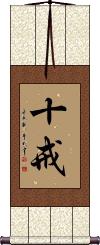Many custom options...
And formats...

十戒 in Chinese / Japanese...
Buy an 十戒 calligraphy wall scroll here!
Ten Commandments
十戒 means Ten Commandments or Ten Precepts.
In the Buddhist context, these are prohibitions consisting of five commandments for the layman:
1. Not to destroy life 不殺生 Pāṇātipātāveramaṇi.
2. Not to steal 不倫盜 Adinnādānāver.
3. Not to commit adultery 不婬慾 Abrahmacaryaver.
4. Not to lie 不妄語 Musāvādāver.
5. Not to take intoxicating liquor 不飮酒 Suramereyya-Majjapamādaṭṭhānāver.
The ten commandments for the monk are the preceding five plus:
6. Not to eat food outside of regulated hours 不非時食 Vikāla-Bhojanāver.
7. Not to use garlands or perfumes 不著華鬘好香塗身 Mālā- Gandha-Vilepana-Dhāraṇa-Maṇḍana-Vibhūṣanaṭṭhānā.
8. Not to sleep on high or broad beds (chastity) 不坐高廣大牀 Uccāsayanā-Mahāsayanā.
9. Not to take part in singing, dancing, musical or theatrical performances 不歌舞倡伎不往觀聽 Nacca-Gīta-Vādita-Visūkadassanāver.
10. To refrain from acquiring uncoined or coined gold, or silver, or jewels 不得捉錢金銀寶物 Jātarūpa-Rajata-Paṭīggahaṇāver.
These original Buddhist commandments date back to about 2500 years ago. The English definitions above are followed by Chinese characters and original Pali pronunciation.
Under the Māhayāna Buddhism, these ten commands for the monk were changed, to accord with the new environment of the monk, to the following: not to kill, not to steal, to avoid all unchastity, not to lie, not to slander, not to insult, not to chatter, not to covet, not to give way to anger, to harbor no skepticism.
Not the results for 十戒 that you were looking for?
Below are some entries from our dictionary that may match your 十戒 search...
| Characters If shown, 2nd row is Simp. Chinese |
Pronunciation Romanization |
Simple Dictionary Definition |
十戒 see styles |
shí jiè shi2 jie4 shih chieh jukkai じゅっかい |
More info & calligraphy: Ten Commandments(1) (Buddhist term) the 10 precepts; (2) Ten Commandments; Decalogue; Decalog; (surname) Jukkai Śikṣāpada. The ten prohibitions (in Pāli form) consist of five commandments for the layman: (1) not to destroy life 不殺生 pāṇātipātāveramaṇi; (2) not to steal 不倫盜 adinnādānāver; (3) not to commit adultery 不婬慾 abrahmacaryaver.; (4) not to lie 不妄語musāvādāver.; (5) not to take intoxicating liquor 不飮酒 suramereyya-majjapamādaṭṭhānāver. Eight special commandments for laymen consist of the preceding five plus: (6) not to eat food out of regulated hours 不非時食 vikāla-bhojanāver.; (7) not to use garlands or perfumes 不著華鬘好香塗身 mālā- gandha-vilepana-dhāraṇa-maṇḍana-vibhūṣanaṭṭhānā; (8) not to sleep on high or broad beds (chastity) 不坐高廣大牀 uccāsayanā-mahāsayanā. The ten commandments for the monk are the preceding eight plus: (9) not to take part in singing, dancing, musical or theatrical performances, not to see or listen to such 不歌舞倡伎不往觀聽 nacca-gīta-vādita-visūkadassanāver.; (10) to refrain from acquiring uncoined or coined gold, or silver, or jewels 不得捉錢金銀寶物 jātarūpa-rajata-paṭīggahaṇāver. Under the Māhayāna these ten commands for the monk were changed, to accord with the new environment of the monk, to the following: not to kill, not to steal, to avoid all unchastity, not to lie, not to slander, not to insult, not to chatter, not to covet, not to give way to anger, to harbour no scepticism. |
沙弥十戒 see styles |
shamijikkai しゃみじっかい |
{Buddh} (See 十戒・1) the ten precepts |
沙彌十戒 沙弥十戒 see styles |
shā mí shí jiè sha1 mi2 shi2 jie4 sha mi shih chieh shami no jikkai |
precepts for novices |
菩薩十戒 菩萨十戒 see styles |
pú sà shí jiè pu2 sa4 shi2 jie4 p`u sa shih chieh pu sa shih chieh bosatsu jikkai |
ten bodhisattva precepts |
二百五十戒 see styles |
èr bǎi wǔ shí jiè er4 bai3 wu3 shi2 jie4 erh pai wu shih chieh nihyaku gojik kai |
The 250 commandments, or 具足戒 perfect or complete commandments, which are obligatory on monks and nuns. They are 四波羅夷 or 四根本極惡the four pārājika; 十三殘 thirteen saṅghāvaseṣa; 二不定法 two aniyata; 三十捨隨 thirty naiḥsargikāḥ-pāyattikāḥ; 九十波逸提ninety prāyaścittikāḥ; 四提舍尼four pratideśanīya; 百衆學 hundred śikṣākaraṇīya, and 七滅諍 seven kinds of vinaya for ending disputes. |
Variations: |
jikkai じっかい |
(1) (十戒 only) {Buddh} the 10 precepts; (2) Ten Commandments; Decalogue; Decalog |
Variations: |
jikkai じっかい |
(1) (十戒 only) {Buddh} the ten precepts; (2) {Christn} Ten Commandments; Decalogue |
Variations: |
jikkai; jukkai じっかい; じゅっかい |
(1) {Buddh} the ten precepts; (2) {Christn} (also written as 十誡) Ten Commandments; Decalogue |
The following table may be helpful for those studying Chinese or Japanese...
| Title | Characters | Romaji (Romanized Japanese) | Various forms of Romanized Chinese | |
| Ten Commandments | 十戒 | jukkai / jukai | shí jiè / shi2 jie4 / shi jie / shijie | shih chieh / shihchieh |
Successful Chinese Character and Japanese Kanji calligraphy searches within the last few hours...




